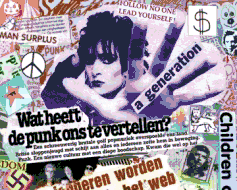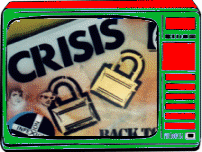










"Crisis, back to reality", Hugo Kaagman, 1979. ( 1.20 - 1.20cm. )
"Do it my way", 1978,

Punk ideologies are a group of varied social and political beliefs associated with the punk subculture and punk rock. It is primarily concerned with concepts
such as mutual aid,[1] against selling out,[2] hierarchy, white supremacy, authoritarianism,[3] anti-consumerism,[3] anti-corporatism, anti-war, imperialism,
conservatism, anti-globalization, gentrification, anti-racism, anti-sexism, class and classism, gender equality, racial equality, eugenics, animal rights,[4] free-
thought and non-conformity. One of its main tenets is a rejection of mainstream, corporate mass culture and its values. It continues to evolve its ideology as
the movement spreads throughout North America from its origins in England and New York and embraces a range of anti-racist and anti-sexist belief systems.
Punk does not necessarily lend itself to any particular political ideology as it is primarily anti-establishment although leftist punk is more common due to the
prevalence of liberal and conservative ideologies in the status-quo.[5]
Punk ideologies are usually expressed through punk rock music and lyrics, punk literature such as amateur fanzines, spoken word performances or
recordings, punk fashion, or punk visual art. Some punks have participated in direct action, such as protest or demonstration disruption, political violence,
ecotage, street barricades, squatting, pirate radio, off-grid energy, graffiti, vandalism and public and business property destruction, and indirect action through
counter-propaganda, protests or boycotts. They support and squat in urban and rural collective houses, with group funds held in common. Punk fashion was
originally an expression of nonconformity, as well as opposition to both mainstream culture and the status quo. Punk fashion often displays aggression,
rebellion, and individualism. Some punks wear accessories, clothing or have tattoos that express sociopolitical messages. They stage Punk Rock Food
Drives, such as D.O.A's Unity for Freedom. Punk visual art also often includes political messages. Many punks wear secondhand clothing, partly as an anti-
consumerist statement.

